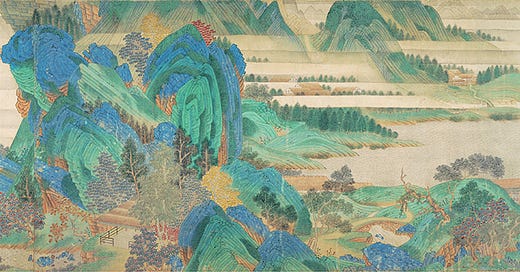Standing High Above the Han River Wang Wei This river flows out of time and space, Its mountains shade from being to unbeing. At Jingmen it connects to watersheds That gauge the Earth; its waters merge with springs That feed the sacred Xiang in the borderlands Of Chu. Towns float along its banks. Its waves Roll out to sway the distant emptiness. An airy day in Xiangyang. Here I’ll stay And join the Marshal of the Mountains in some wine. 王维 汉江临眺 楚塞三湘接,荆门九派通。 江流天地外,山色有无中。 郡邑浮前浦,波澜动远空。 襄阳好风日,留醉与山翁。
Here we have Wang Wei in a relaxed mode. This is not his tightest composition, by any means, but the middle of the poem - particularly the second couplet - capture his painter’s abstract view of the landscape with perfection. So much so, that to make them sit properly, I pulled those lines to the front.
Wang starts the poem by marvelling at how the Han River connects with every drop of water in the world, through its connection to the Yangtze. Then he goes on to imagine that it flows right out of this world. But that’s the beating heart of the poem, and so I put it first, along with its partner, explaining how the hills alongside the Han also run forever into the infinite, into nothingness. One of the ways to think about what he means here is to look at Chinese landscape paintings: often the water of the rivers is unpainted, and artists simply allow the river to merge with the sky in the background. Similarly, the gradual desaturation of colour in Chinese paintings conveys distance, and that’s how Wang Wei is looking at the mountains.
The line about the towns floating on the river can be read the same way; of course the line about movement in distant space cannot be purely about a still painting.
Notes:
Jingmen: A hilly area south of where Wang was standing, where the Han River meets the Yangtze.
Watersheds that gauge the Earth: Traditional geographers divided the Yangtze into nine tributary streams, whose drainage basins defined central China.
The sacred Xiang: The River Xiang also flows into the Yangtze, from the south. During the Tang, this river still represented the wild south. Goddesses were reputed to live along its banks, and it was the mythic land that birds migrated to in winter.
Chu: The old name for the area around the lower Yangtze, particularly the land south of the Yangtze, which was still regarded as fairly wild.
Xiangyang: Still a city to this day. Now in Hubei province.
Marshal of the Mountains: The history notes solemnly inform us that this was a real person, Shan Jian, a general of some previous century, who conveniently bore the surname “Mountain,” and who enjoyed spending time in… wait for it… the mountains! In fact, the words Wang uses in the poem could equally mean: an old guy who lives in the hills. I feel like Wang probably knew the historical reference, and was using it; but not because he was trying to squeeze any meaning out of the identity of Shan Jian. Rather he was just used to using historical texture in his poetry because that was what everyone was taught to do.
Here’s Cinix with the reading in reconstructed Tang Chinese:



